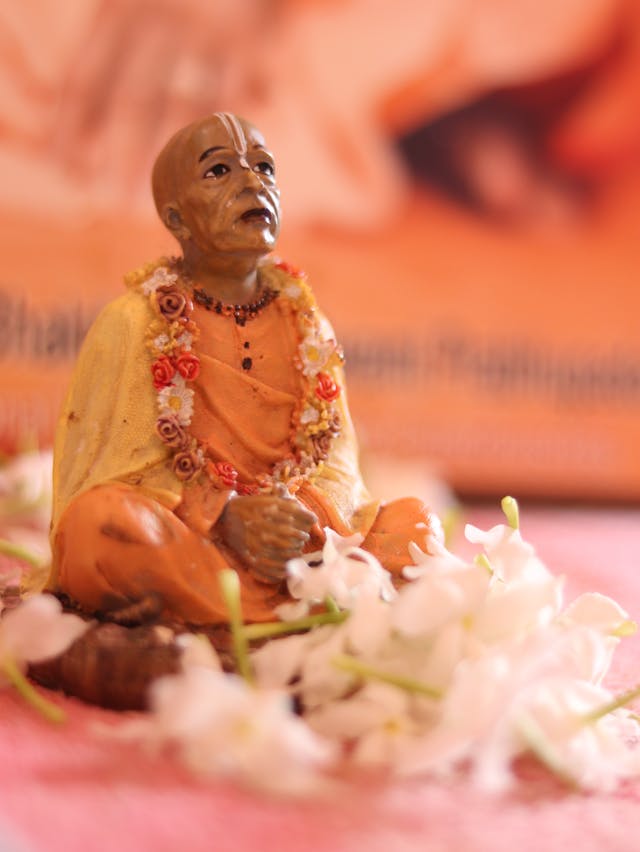The arrest of Chinmoy Krishna Das, a prominent ISKCON monk and staunch advocate for minority rights in Bangladesh, has sent shockwaves across the region and beyond. His detention on charges of sedition has not only provoked mass protests in India and Bangladesh but has also ignited an urgent international dialogue about the safety and security of religious minorities in the country.
This development has brought renewed attention to the long-standing challenges faced by Bangladesh’s Hindu community, which has often found itself caught in the crossfire of political and social unrest. The case of Chinmoy Krishna Das has become a symbol of the ongoing struggle for equality, justice, and minority rights in the region.
Who is Chinmoy Krishna Das?
Chinmoy Krishna Das, a respected leader in the International Society for Krishna Consciousness (ISKCON), is widely recognized for his relentless efforts to protect and promote the rights of religious minorities in Bangladesh. His advocacy has been instrumental in raising awareness about the challenges faced by Hindus and other marginalized communities in the country.
Das’s arrest occurred at Dhaka Airport, where authorities detained him as he was preparing to travel abroad. The charges of sedition against him are linked to an incident during a rally he organized, where a saffron flag was allegedly hoisted above the Bangladeshi national flag. While this act is viewed by some as a violation of national honor, his supporters argue that it has been misconstrued and politicized to suppress his activism.
For many, his arrest is not just a legal matter but a blatant attempt to silence a prominent voice advocating for justice and equality.
Protests Erupt Across Borders
The arrest of Chinmoy Krishna Das has sparked an unprecedented wave of protests across Bangladesh and India. Thousands have taken to the streets, demanding his immediate release and condemning what they view as a targeted attack on the Hindu community.
In Kolkata, the Hindu Jagaran Manch organized a massive rally that drew thousands of participants. Protesters chanted slogans calling for Das’s freedom and urged both the Indian and Bangladeshi governments to prioritize the safety and rights of minorities. Demonstrations were also held in other parts of India, including Delhi and Mumbai, where social and political organizations joined forces to amplify their demands.
The Indian government has expressed serious concern over the arrest, with the Ministry of External Affairs (MEA) issuing a strong statement. The MEA called on Bangladeshi authorities to respect minority rights and ensure the safety of individuals like Das, who are working to uphold democratic values and justice.
International Condemnation and Calls for Action
The arrest has also drawn widespread condemnation from international leaders and organizations. Former Bangladeshi Prime Minister Sheikh Hasina, who was ousted from power earlier this year, has spoken out against the detention. She described the arrest as a reflection of the increasing challenges faced by religious minorities in the country, emphasizing the urgent need for systemic reforms to address these issues.
Human rights organizations, including Amnesty International and Human Rights Watch, have also issued statements expressing concern over the treatment of Chinmoy Krishna Das and the broader implications for human rights in Bangladesh. They have called for his immediate release and urged the international community to hold the Bangladeshi government accountable for ensuring the safety and dignity of all its citizens.
The Plight of Religious Minorities in Bangladesh
The Hindu community in Bangladesh, which constitutes approximately 8% of the country’s population, has faced a series of challenges in recent years. Reports of vandalized temples, forced conversions, and mob violence have become alarmingly frequent. The arrest of Chinmoy Krishna Das is being viewed as part of a broader pattern of marginalization and suppression of minority voices.
Since the political upheaval in Bangladesh earlier this year, the situation for minorities has worsened. Activists have documented numerous cases of targeted violence and systemic discrimination, which have created an environment of fear and insecurity for the Hindu community and other religious minorities.
Das’s arrest has served as a rallying point for activists and organizations advocating for the rights of minorities. It has reignited discussions about the urgent need for legal and institutional measures to protect vulnerable communities and ensure their full participation in society.
The Role of ISKCON and Global Hindu Communities
ISKCON, the spiritual organization to which Chinmoy Krishna Das belongs, has been at the forefront of efforts to support and empower Hindu communities worldwide. In response to his arrest, ISKCON leaders have issued statements condemning the charges and calling for his immediate release.
The global Hindu community has also rallied behind Das, organizing prayer meetings, vigils, and awareness campaigns. These efforts aim to draw international attention to the plight of religious minorities in Bangladesh and to mobilize support for concrete actions to address these issues.
The Larger Implications
The arrest of Chinmoy Krishna Das is not just about one individual—it is a stark reminder of the broader challenges faced by religious minorities in Bangladesh. It raises important questions about the country’s commitment to protecting the rights of all its citizens, regardless of their religious or cultural background.
The incident also underscores the need for international solidarity in addressing human rights violations and ensuring justice for marginalized communities. As protests continue and international pressure builds, the Bangladeshi government will face increasing scrutiny over its handling of the case and its broader approach to minority rights.
What Needs to Be Done?
To address the challenges highlighted by this incident, several steps are essential:
Immediate Release of Chinmoy Krishna Das: The Bangladeshi government must release Das and ensure that his legal and human rights are respected.
Strengthening Minority Protections: Comprehensive legal and institutional reforms are needed to safeguard the rights of religious minorities and prevent future incidents of discrimination and violence.
International Oversight: The global community, including human rights organizations and governments, must remain vigilant and hold Bangladesh accountable for its commitments to human rights and equality.
Dialogue and Reconciliation: Efforts to foster interfaith dialogue and promote mutual understanding are crucial for building a more inclusive and harmonious society.
The arrest of Chinmoy Krishna Das is a watershed moment in the ongoing struggle for minority rights in Bangladesh. It has galvanized activists, leaders, and communities across the globe, highlighting the urgent need for action to protect the rights and dignity of all individuals.
As protests continue and calls for justice grow louder, the response of the Bangladeshi government will be critical in determining the future of minority rights in the country. The international community must stand in solidarity with those advocating for justice, ensuring that the voices of marginalized communities are heard and their rights upheld.
By supporting movements for justice and equality, we can honor the legacy of individuals like Chinmoy Krishna Das and work towards a world where every person is treated with dignity and respect, regardless of their religion or background.



